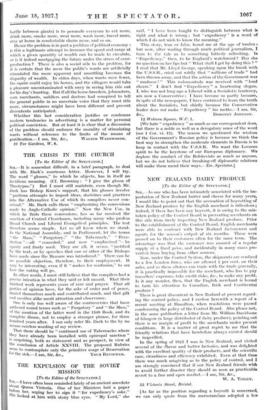THE CRISIS IN THE CHURCH
[To the Editor of the SPECTATOR.] SIR,—It is somewhat difficult, in a brief paragraph, to deal with Mr. Dark's courteous letter. However, I will try. The word " glosses," to which he objects. has in itself no invidious meaning. (Cf. Browning : " I give the glossa of Theotypas.") But I must still maintain, even though Mr. Dark has Bishop Knox's support, that his glosses involve "partisan attempts to import ideas, doctrines and practices into the Alternative Use of which its compilers never con- ceived." Mr. Dark calls them " emphasizing the concessions made to Anglo-Catholic opinion." Now the New Use, in which he finds these concessions, has so far received the sanction of Central Churchmen, including many who profess Broad Church and Liberal Evangelical principles. The test therefore seems simple. Let us all know where we stand- In the National Assembly, and in Parliament, let the terms " the Mass," " Purgatory," " the Tabernacle," " Bene- diction "—all " conceded," and now " emphasized "—be Openly and freely used. They are all, it seems, " justified by the text, or by speeches that one or other of the Bishops have made since the Measure was introduced." There can be no possible objection, therefore, to their employment. It may be interesting, even if it " makes for confusion," to see how the voting will go.
In other words, I must still believe that the compilers had a precise intention in what they said or left unsaid. That their finished work represents years of care and prayer. That all parties of opinion have, for the sake of order and of peace, denied themselves much and contributed much, and that gift and sacrifice alike merit attention and observance.
One is only too well aware of the controversies that have gathered round terms such as " Purgatory " and " the Mass," of the mention of the latter word in the 1549 Book, and its complete disuse, not to employ a stronger phrase, for three hundred years after. I can only refer Mr. Dark to the by no means careless wording of my review. That there should be " continued use of Tabernacles where they have already been installed with episcopal sanction " iS surprising, both as statement and as prospect, in view of the conclusion of Article XXVIII. The proposed Rubrics seem to contemplate only the primitive usage of Reservation


























































 Previous page
Previous page